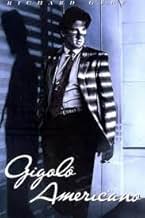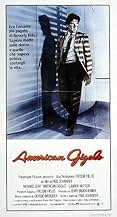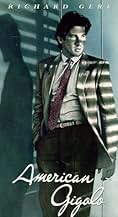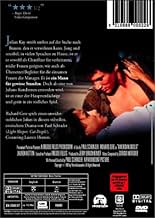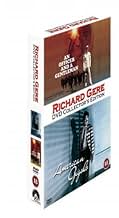Julian Kay lo tiene todo: autos, ropas, contactos con la crema de Beverly Hills y clientas adineradas. Pero todo se derrumba cuando le hace un favor a su antigua proxeneta, y la clienta apar... Leer todoJulian Kay lo tiene todo: autos, ropas, contactos con la crema de Beverly Hills y clientas adineradas. Pero todo se derrumba cuando le hace un favor a su antigua proxeneta, y la clienta aparece muerta poco después.Julian Kay lo tiene todo: autos, ropas, contactos con la crema de Beverly Hills y clientas adineradas. Pero todo se derrumba cuando le hace un favor a su antigua proxeneta, y la clienta aparece muerta poco después.
- Dirección
- Guionista
- Elenco
- Premios
- 2 nominaciones en total
- Anne
- (as Nina Van Pallandt)
- Judy Rheiman
- (as Patti Carr)
- Hollywood Actor
- (as MacDonald Carey)
- Dirección
- Guionista
- Todo el elenco y el equipo
- Producción, taquilla y más en IMDbPro
Opiniones destacadas
He makes himself a sex symbol, of sorts, as he works out religiously and always gets the best clothes (like a peacock perhaps). Schrader puts a lot of focus on the relationship Julian has with Michelle, who genuinely cares about him and is probably the only person he knows who is straight with him (certainly not the pimp played by Bill Duke, or his mentor who has her own gaggle of men and women to 'send out'). Of course sexuality plays into it, but I liked the fact that Schrader didn't focus squarely on it. He's interested in some of the mechanics of it (there's a scene where Julian/Michele do it, but it's shot much in the way of Godard's A Married Woman, lots of single shots of body parts, some flesh, but selective eroticism), and then, mostly, the consequences.
But, again, the look of the film should be an indicator. This is Los Angeles of 1979/1980, but it portends the future decade not just in the city but in the kind of middle-upper (or just upper) class lifestyle of expensive restaurants, good drinks, good clothes, and sometimes good women (or just lonely older women). Schrader even has a way of looking ahead to the future with Giorgio Moroder's score, which takes Blondie's "Call Me" and turns it into a synth score full of dread and mystery and drama. On top of how the look, its stylish exteriors and careful lighting (the Bruckheimer look before Tony Scott took it over with smoke machines), and the depth of the script, Gere is also fantastic here. He was on a roll right after Days of Heaven, and here he lights up the screen with charisma, pathos, intensity, and a sense of where to take the scenes where they need to be.
He, much like the environment around him, makes up what is the backdrop for a tale of morality in high society, hypocrisy where it may lay in the highs and lows, and what it means to fall in love. The only part it doesn't fully work is as a full-fledged thriller (again, the murder-mystery element is the weakest link), but everything else sparks the screen with interest and excitement.
Performances are OK. This was Richard Gere's breakthrough role.
¿Sabías que…?
- TriviaDebbie Harry has said the film's main title song "Call Me" was inspired by driving and she visualized the film's opening sequence when writing it. She said: "When I was writing it, I pictured the opening scene [of the movie], driving on the coast of California." Harry was first given an instrumental rough track titled "Man Machine" by Giorgio Moroder and was asked to write the melody and lyrics for the song. Reportedly, this only took her a few hours to do.
- ErroresHelicopter carrying the camera is clearly reflected just above the right rear wheel of the Mercedes.
- Citas
Julian Kaye: Why me? Why did you pick me?
Leon: Because you were framable. You've stepped on too many toes. Nobody ever cared about you. I never even liked you much myself.
- Versiones alternativasABC edited 21 minutes from this film for its 1983 network television premiere.
- Bandas sonorasThe Love I Saw in You Is Just a Mirage
by Smokey Robinson (as W. Robinson) and Marvin Tarplin (as M. Tarplin)
Performed by Smokey Robinson & The Miracles (as Smokey Robinson and The Miracles)
Courtesy of Motown Records
Selecciones populares
Detalles
- Fecha de lanzamiento
- País de origen
- Sitio oficial
- Idiomas
- También se conoce como
- American Gigolo
- Locaciones de filmación
- Sunset Plaza Apartments - 1220 Sunset Plaza Drive, Mt. Olympus, Hollywood Hills, Los Ángeles, California, Estados Unidos(Westwood Apartment Hotel, demolished 1987 and replaced by a totally different building - see GE at the actual address)
- Productoras
- Ver más créditos de la compañía en IMDbPro
Taquilla
- Presupuesto
- USD 4,800,000 (estimado)
- Total en EE. UU. y Canadá
- USD 22,743,674
- Fin de semana de estreno en EE. UU. y Canadá
- USD 3,559,930
- 3 feb 1980
- Total a nivel mundial
- USD 22,745,134


